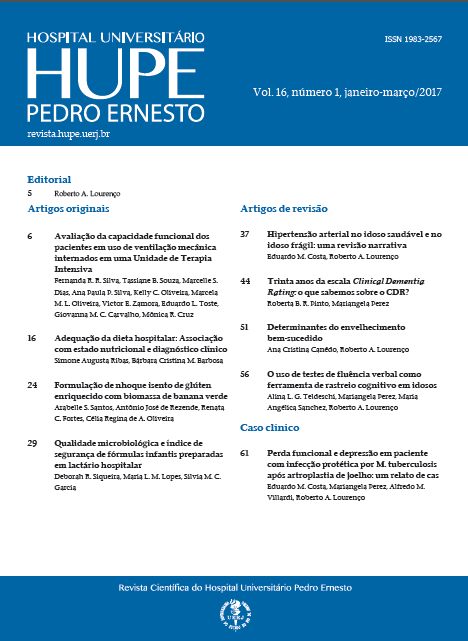Determinantes do envelhecimento bem-sucedido
DOI:
https://doi.org/10.12957/rhupe.2017.33269Resumo
Introdução: Nas últimas décadas, a expectativa de vida tem aumentado de forma significativa em muitos países. Porém, para que esta transformação demográfica seja sustentável em termos econômicos, sociais e de saúde pública, é preciso que a longevidade ocorra paralelamente à preservação da saúde e funcionalidade. Sendo assim, a promoção do envelhecimento bem-sucedido tem sido tema de interesse crescente tanto no cenário das políticas públicas quanto nos estudos sobre envelhecimento humano. Objetivos: Discutir os fatores determinantes e preditores do envelhecimento bem-sucedido. Métodos: Revisão narrativa com busca de artigos nos bancos PubMed e SciElo utilizando os descritores: “envelhecimento bem-sucedido”, “envelhecimento saudável”, “determinantes do envelhecimento” e “preditores de envelhecimento”. Resultados e Discussão: Do ponto de vista fisiológico, o envelhecimento varia amplamente entre os indivíduos, sendo que algumas pessoas apresentam extensas alterações fisiológicas e outras apresentam poucas ou nenhuma. Parte desta variabilidade pode ser explicada pela heterogeneidade genética, porém estima-se que 25% seja determinado pela genética e 75% por fatores extrínsecos, como fatores ambientais, comportamentais, psicológicos inflamatórios, endócrinos e sociais. As variáveis com maior evidência de associação com envelhecimento bem-sucedido são idade, doenças articulares, audição, atividades de vida diária e tabagismo. Conclusões: A implementação de estratégias efetivas para a promoção do envelhecimento bem-sucedido exige que se desenvolva maior conhecimento sobre os seus fatores determinantes: tanto aqueles relacionados à taxa de declínio, quanto os fatores protetores para a manutenção da vitalidade e resiliência ao estresse.
Descritores: Envelhecimento bem-sucedido; Envelhecimento saudável; Determinantes; Preditores.
Referências
-Rowe JW, Kahn RL. Human aging: usual and successful. Science. 1987 Jul 10;237:143-9.
-Rowe JW, Kahn RL. Successful aging. Aging (Milano). 1998 Apr;10:142-4.
-Depp CA, Jeste DV. Definitions and predictors of successful aging: a comprehensive review of larger quantitative studies. Am J Geriatr Psychiatry. 2006 Jan;14(1):6-20.
-Bowling A, Iliffe S ."Which model of successful ageing should be used? Baseline findings from a British longitudinal survey of ageing." Age and Ageing. 2006;35(6):607-614.
-Glass, TA. Assessing the success of successful aging. Ann Intern Med. 2003 Sep 2;139(5):382-3.
-Franklin NC, Tate CA. Lifestyle and Successful Aging: An Overview. American Journal of Lifestyle Medicine. 2009 January 1;3(1):6-11.
-Fernandez-Ballesteros R, Robine JM, Walker A, et al. Active aging: a global goal. Curr Gerontol Geriatr Res. 2013;298012.
- Pruchno RA, Wilson-Genderson MA. Longitudinal Examination of the Effects of Early Influences and Midlife Characteristics on Successful Aging. J Gerontol B Psychol Sci Soc Sci. 2014 May 13.
-Hsu HC, Jones BL. Multiple trajectories of successful aging of older and younger cohorts.The Gerontologist. 2012;52:843-856.
-Berkman LF, Seeman TE, Albert TM, et al. High, usual and impaired functioning in community-dwelling older men and women: findings from the MacArthur Foundation Research Network on Successful Aging. J Clin Epidemiol. 1993 Oct;46(10):1129-40.
-Guralnik JM, kaplan GA. Predictors of healthy aging: prospective evidence from the Alameda County study. Am J Public Health. 1989 Jun;79(6):703-8.
- Strawbridge WJ, wallagen ML. Successful aging and well-being: Self-rated compared with Rowe e Kahn. The Gerontologist. 2002;42(6):727-883.
-Roos NP, havens B. Predictors of successful aging: a twelve-year study of Manitoba elderly. Am J Public Health. 1991 Jan; 81(1):63-8.
- Chaves ML et al. Predictors of normal and successful aging among urban-dwelling elderly Brazilians. J Gerontol B Psychol Sci Soc Sci. 2009 Sep; 64(5):597-602.
-Stowe JD, Cooney TM. Examining Rowe and Kahn's Concept of Successful Aging: Importance of Taking a Life Course Perspective. Gerontologist. 2014 Jun 6.
- Brandt M, Deindl C, Hank K. Tracing the origins of successful aging: The role of childhood conditions and social inequality in explaining later life health. Social Science & Medicine. 2012; 74:1418-1425.
-Schafer MH, Ferraro KF. Childhood misfortune as a threat to successful aging: Avoiding disease. The Gerontologist. 2012;52:11-120.
-Christakis NA, Fowler JA. Connected: The surprising power of our social networks and how they shape our lives. NewYork: Little Brown and Company. 2009.
-Bookwala J. The role of marital quality in physical health during the mature years. Journal of Aging and Health. 2005;17:85-104.
-Hung L, Kempen GIJM, Devries NK. Crosscultural comparison between academic and lay views of healthy ageing: A literature review. Ageing and Society. 2010;30:1371-1391.
- Brandt M, Deindl C, Hank K. Tracing the origins of successful aging: The role of childhood conditions and social inequality in explaining later life health. Social Science & Medicine. 2012;74:1418-1425.
-Murabito J, Yuan R, Lunetta K. The Search for Longevity and Healthy Aging Genes: Insights From Epidemiological Studies and Samples of Long-Lived Individuals. J Gerontol A Biol Sci Med Sci. 2012; 67A(5):470-479.
-Hjelmborg J, Iachine I, Skytthe A. Genetic influence on human lifespan and longevity. Hum Genet. 2006;119(3):312-321.
-Reed T, Dick D. Heritability and validity of healthy physical aging (wellness) in elderly male twins. Twin Res. 2003;6:227-234.


